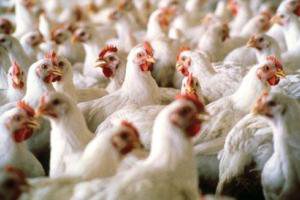Canadian research keeps poultry industry competitive

The University of Guelph is a key participant in new studies being conducted through the national Poultry Science Cluster, designed to keep the poultry industry competitive and address consumer concerns about animal welfare and environmental preservation.
Seven projects being led by researchers at the Ontario Agricultural College (OAC), the Ontario Veterinary College (OVC) and the College of Physical and Engineering Science will receive a total of $3.1 million of the cluster’s latest $5.6-million funding allocation.
Overall, the cluster will support 17 poultry studies by 59 researchers across Canada — at Guelph and at the universities of Alberta, Manitoba, Montreal, Ottawa and Saskatchewan, as well as at Agriculture and Agri-Food Canada research facilities.
Gerry Ritz, federal minister of agriculture and food, announced the support Tuesday at the Poultry Industry Council headquarters in Arkell. The cluster will receive $4 million from the federal government, with the remainder coming from the poultry sector.
Ritz said researchers will mainly aim to develop new vaccines, reduce the environmental footprint of poultry farms and give poultry farmers access to high-calibre training opportunities.
“We’re supporting what industry has said are its highest priorities,” he said.
For example, in OAC, Prof. Gregoy Bedecarrats, Animal and Poultry Science, is validating a new low-energy LED light bulb designed to enhance commercial egg laying. After investigating the effects of light wavelength on reproduction and behaviour of layers, Bedecarrats partnered with industry to design the novel LED bulb. A commercial version is being field tested now as part of this cluster project.
At OVC, Prof. John Prescott, Pathobiology, is continuing work on understanding and controlling the bacterial cause of necrotic enteritis in chickens. Prescott is using sophisticated molecular methods to identify genes important in disease, and engineering an attenuated live oral Clostridium perfringens vaccine. In preliminary results, a prototype vaccine has been shown to protect immunized birds from this disease.
The research funds for the cluster will be administered through the Canadian Poultry Research Council (CPRC) on behalf of its five members: Chicken Farmers of Canada, Canadian Hatching Egg Producers, Canadian Poultry and Egg Processors Council, Egg Farmers of Canada and Turkey Farmers of Canada.
“Canada’s poultry industry has made embracing innovation part of its vision, in recognizing the need to be dynamic and to foster efficiency for farmers and our industry partners,” says Alberta turkey farmer Roelef Meijer, chair of the CPRC. “This announcement of funding for a second poultry science cluster is a substantial contribution to the sector’s future. It will enable researchers to find more immediate answers to industry issues and to provide important information to farmers, stakeholders and consumers.”
The poultry science cluster is one of 10 national agri-science clusters funded under the federal Growing Canadian Agri-Innovations Program. Almost $70 million in funding is being allocated to 10 science clusters in beef cattle, dairy, swine/pork, poultry, canola/flax, pulse, wheat breeding, edible horticulture, ornamental horticulture and organic agriculture.
The University of Guelph has wide-ranging expertise in poultry research. The Poultry Health Research Network (PHRN) at U of G brings together poultry researchers and poultry health specialists studying everything from basic biology and environmental concerns to poultry disease, production and welfare. The PHRN consists of 40 individuals from the University of Guelph, the Public Health Agency of Canada and the Ontario Ministry of Agriculture and Ministry of Rural Affairs, as well as poultry industry organizations, including the Poultry Industry Council and the Canadian Poultry Research Council.
As well, Guelph is home to a virtual poultry research centre for leading Canadian scientists in poultry behaviour and welfare. The centre is a joint initiative of Agriculture and Agri-Food Canada, the Poultry Industry Council and the Canadian Poultry Research Council. Officials from each agency serve on an advisory committee to advance the centre and advise on research strategies.













